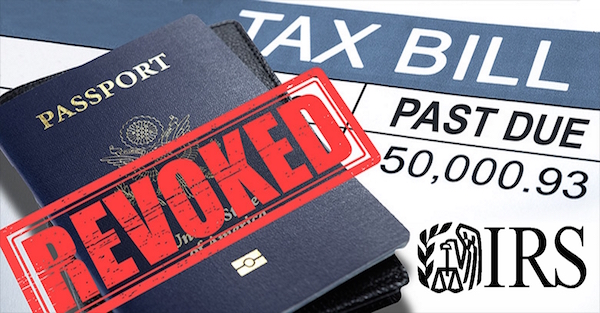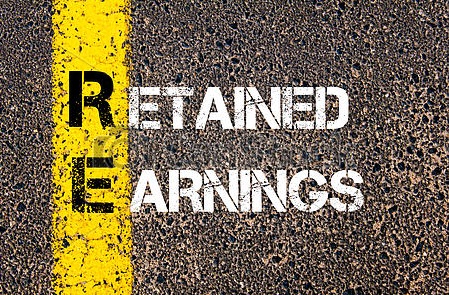The IRS to Seize 362,000 US Passports
The IRS plans to seize 362,000 US passports by refusing to renew passports of anyone with a substantial tax debt and now controls who is allowed to travel abroad. In this article, we’ll look at who is affected by this newfound authority and what you can do to protect yourself from the IRS.
Giving the IRS authority over your passport means that the taxman has the right to determine who travels outside of the country. Only those who have paid unto Caesar what he claims they owe shall be granted the privilege of international travel.
This represents a major change in how the United States government looks at the passports it issues. Americans have thought of a US passport as a birthright… or a right conveyed upon the select few who complete the immigration process. The passport tells the world that we are American citizens and gives us freedom of movement.
This all changed when the IRS asserted control over who is allowed a passport. As of today, a US passport is no longer a right, it’s a privilege. Only those whom the IRS deems worthy may travel. Only those who have paid their taxes are allowed to live and work outside of the country. Only those with clean tax accounts may visit family abroad.
Rest assured that the IRS will use your passport as a weapon to collect whatever taxes they believe you owe. If your passport is frozen because of a tax debt, there’s only one way to get it back. You must pay your debt in full.
Sure, you still have all the rights and protections you had before when battling the IRS. If you wish to dispute the amount owed, you’re free to do so. You can fight it out with the revenue officer, appeals, and finally the US Tax Court or in Federal Court.
But, this will take time. In my experience, an easy tax dispute case takes 6 months. A complex case, especially one involving a large amount of money, can drag on for years. Go to court and you’re looking at 3 to 4 years from the Notice of Deficiency to a resolution.
During this time, your passport will remain frozen. If you’re a US expat living and working abroad, can you really afford to return to the US for months or years to fight it out? Or will you be forced to pay up to get your passport back?
And what about us expats when the IRS begins revoking current passports? So far, the Service has only frozen passports, which means they refuse to renew a passport which has been lost or has expired. But the law also allows the IRS to revoke the passport of anyone who owes the IRS a substantial amount (more than $51,000).
If you’re an American abroad, and your only passport is revoked, you’ll be forced to return to the United States to settle your debt.
In most cases, expats learn of the loss of their passport when they attempt to enter a country and are refused. If this happens, you will be held in “airport jail” until the next flight to the United States. You will then be forcibly placed on a plane and sent home.
Yes, you will be the first fight to anywhere in the US. Whatever happens when you land, and how you pay your expenses once there, is your problem. If you have no family or friends to take you in, best of luck. When your only passport is revoked, the airline is required by law to return you to your home country for free, so they can give a damn where you’re dropped off.
You have no right to appeal or to an attorney. Because you were not allowed to “enter” the country, you have no legal rights. You are not being deported, you’re just being refused entry. The ONLY option at this point is the first flight back to your home country.
And I expect this to become standard practice by US agencies. Now that the government is treating your passport as a privilege rather than a right, I expect other agencies to take notice and get in on the money grab. What about expats with student loan debt, back child support, state taxes, or any number of other debts payable to government agencies?
Here’s How to Know if Your Passport’s Frozen
Basically, anyone who owes $51,000 or more to the IRS will have their passports frozen. This includes tax. interest and penalties. Thus, it’s very possible for a debt to have started out at $20,000 or so and to have grown to more than $51,000 with interest and penalties over a few years.
Also, any expat with a penalty for failing to report their foreign bank account (to file the FBAR form) or any of the offshore reporting forms (5471, 3520, etc.) is likely over the $50,000 limit. These penalties are often $50,000 not including taxes due.
Likewise, anyone who hasn’t filed their US returns should be worried. If the IRS computers have any information on you, they will create what is called a Substitute for Return on your behalf. These computer-generated returns create a tax debt in the system. This automated debt, plus interest and penalties, will then be used to freeze or rescind your passport and your travel privileges.
Quite a few expats end up in debt to the IRS computers because they don’t file their returns The biggest concern is with expats who have unfiled returns and a US brokerage account. The expat earned a small amount of money abroad or maybe was retired. He also had a small gain or loss in his US brokerage account.
The bottom line is that he didn’t think the gains were significant enough to bother filing a tax return… and he would be wrong, very wrong.
Your brokerage reports only sales to the IRS. That means IRS computers see only half of the transaction, the sale. They don’t know how much you paid for the stock and don’t know that you lost money unless you file a return.
You may have sold $1 million in stock for which you paid $1.2 million. You really lost $200,000, but the IRS computers calculate your tax due on a gain of $1 million! This happens all the time, especially with volume traders. A day trader could have used the same $100,000 in cash to generate millions in sales and still lost money at the end of the year.
In these cases, the expat doesn’t file a return and doesn’t receive any of the letters the IRS sends to his last known domestic address. Then the IRS computers take the sale data and create a wildly inaccurate Substitute for Return and a massive tax bill.
A few years pass and the expat mails in his US passport for renewal. Instead of getting a new passport back, he receives a letter saying is passport renewal is rejected and that he must resolve his tax debt in full before he applies again.
As I said above, 362,000 Americans have had their passports frozen and renewals rejected. So far, we’ve only seen renewal rejections. God help us expats when the IRS begins to revoke passports to force us home.
Per the IRS website, If you meet one of the following criteria, your passport won’t be revoked nor your passport renewal denied:
- Being paid timely with an IRS-approved installment agreement
- Being paid timely with an offer in compromise accepted by the IRS, or a settlement agreement entered with the Justice Department
- For which a collection due process hearing is timely requested regarding a levy to collect the debt
- For which collection has been suspended because a request for innocent spouse relief under IRC § 6015 has been made
Additionally, a passport won’t be at risk for anyone:
- Who is in bankruptcy
- Who is identified by the IRS as a victim of tax-related identity theft
- Whose account the IRS has determined is currently not collectible due to hardship
- Who is located within a federally declared disaster area
- Who has a request pending with the IRS for an installment agreement
- Who has a pending offer in compromise with the IRS
- Who has an IRS accepted adjustment that will satisfy the debt in full
What Can You do to Protect Yourself
First, don’t lose your passport! If you owe money to the IRS. You won’t be receiving a new passport until your debt is paid in full. Be very careful with your travel document.
Second, move your investments and IRA accounts out of the United States to prevent them from being used to create an automated tax debt. Form offshore structures to hold accounts and maximize both privacy and asset protection. This also protects the accounts from being seized by the IRS.
Third, file your delinquent returns to get right with the IRS and continue filing each and every year going forward. Be sure to report the structures and accounts I suggested you create in #2 above. Even if your gains are small, all US expats should file their returns to prevent the IRS computers for doing it for them.
Fourth, take steps to protect your status as an expat while you have a valid passport. You can do this by a) securing a residency visa in the country where you live, and/or 2) by purchasing or otherwise acquiring a second passport.
A second passport gives you freedom of movement should you lose your US passport. With a second passport, you can leave the United States and travel to any country that grants you entry without a visa. Thus, the more visa-free countries you have, the more valuable the passport.
For example, you can purchase a passport from a country like Dominica for about $125,000. This will give you visa-free access to 122 countries. This second passport program can be completed in a few months
If you want an EU passport, consider Bulgaria. Purchase just over $1 million in government bonds and receive residency immediately and citizenship in about 18 months. This passport will give you visa-free access to 169 countries and territories.
In contrast, residency allows you to live in a particular country and to “earn” a second passport over a number of years. Once you have permanent residency, you won’t be forced out if you lose your passport. You won’t be able to travel, but you can’t be taken back to the US to pay up… you can negotiate from a stronger position and settle your tax debt from abroad on your terms.
The easiest country for a US citizen to obtain residency is Panama. Invest $20,000 in Panama’s reforestation visa program and get residency. You can apply for citizenship and a passport after you’ve been a resident for 5 years.
Keep in mind that you must have a valid US passport to apply for a second passport, citizenship or residency. Once your US passport has expired or has been revoked, you’re stuck. You will need to take action well in advance to protect your right to travel.
Fifth, the only country you can enter without a passport from the United States is Mexico. Any time you travel to a foreign country by air or sea, you must present a valid passport. So, if you fly into Mexico, you must have a passport.
The only exception is when you drive into Mexico. No passport is required and no checks are performed. Then, once you’re in Mexico, you can take a domestic flight to any city in the country using only your valid ID (such as a US driver’s license).
So, anyone who loses their passport can travel throughout Mexico so long as they enter at a land crossing.
The above on Mexico is based on years of personal experience and not a statement of the law. You should have a passport with you, valid or otherwise, but, once you’re in, you can travel throughout the country on your driver’s license.
I hope you’ve found this article to be helpful. For more information on a second residency or second passport, or to be connected with an expat tax expert, please contact me at info@premieroffshore.com or call us at (619) 483-1708.






